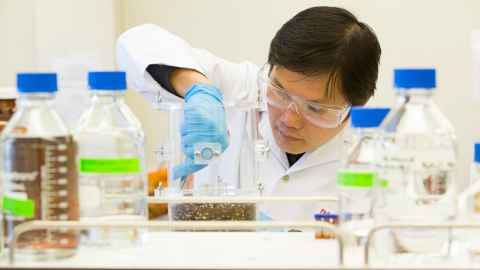Environmental engineering
Our expertise and facilities help us to examine urban stormwater management, coastal engineering, ecohydraulics, infrastructure asset management, contaminated soil remediation and innovative wastewater treatment technologies.

Environmental engineers are responsible for many of the essential services taken for granted in our contemporary way of life and are at the forefront of the planning and execution of engineering projects so as to minimise environmental, social and cultural impacts. They plan, design, construct and maintain many types of community facilities and infrastructure. Projects include water supply and treatment facilities, wastewater treatment, solid waste disposal systems, drainage systems and pollution prevention and mitigation technologies.
Our research
Our main research projects currently include:
- Fate and transport of contaminants in the environment
- Mitigation of greenhouse gas emissions through novel technologies
- Treatment of emerging contaminants by membrane processes
- Biochar production, characterisation and application in contaminant mitigation and application in non-soil areas (Biochar-composite, green concrete manufacturing)
- Hydrothermal carbonization of food waste
- Assessment of energy efficiency of wastewater treatment facilities
- Novel technologies for water and wastewater treatment
- Anaerobic bacteriology and biotechnology for biosynthesis
- Resource recovery from wastewater and organic wastes
- Detection and mitigation of antibiotic resistant genes and microorganisms, and toxic contaminants
The Environmental Engineering Laboratory
The Environmental Engineering Laboratory is a modern research and teaching facility. It is home to several advanced analytical instruments including high performance liquid (HPLC) and gas (GC) chromatographs with a variety of detectors, liquid chromatography with tandem mass spectrometry (LCMSMS), atomic absorption spectrophotometer (AAS), ion chromatograph (IC), nutrient autoanalyser, and total organic carbon analyser.
Other advanced instruments in the lab include a voltammeter for metal speciation work and a microelectrode fabrication system for constructing ion-specific microelectrodes. They are used by both undergraduate and postgraduate students in a wide range of research projects to analyse organics (such as fatty acids, pesticides, polyaromatics, chlorinated hydrocarbons), inorganic nutrients, and heavy metals.